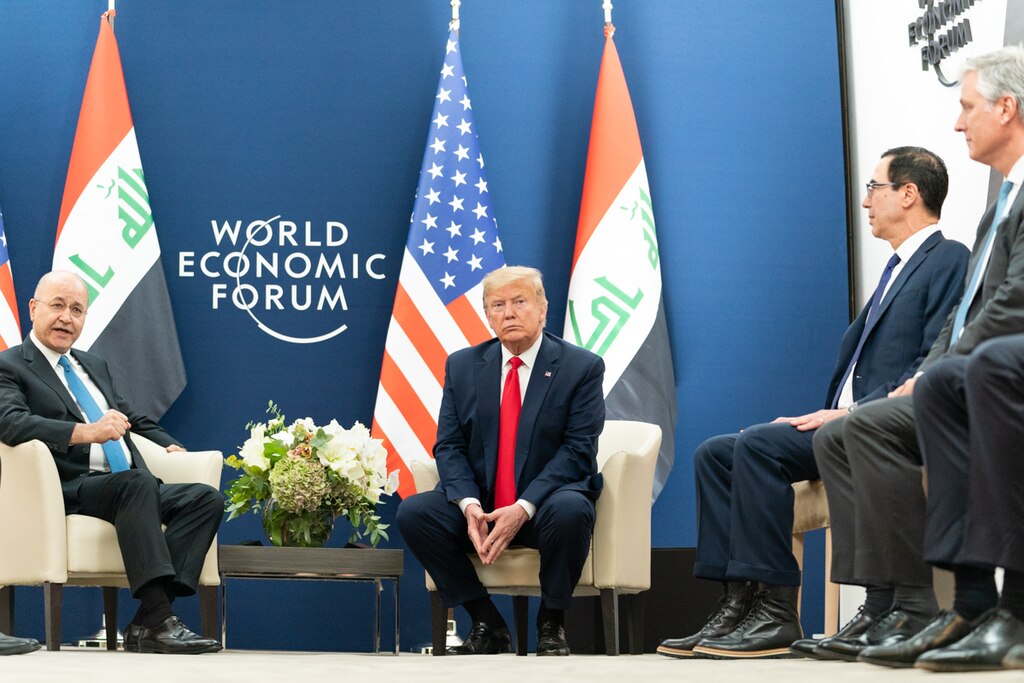U.S. President Donald Trump called for OPEC to lower oil prices and demanded global interest rate cuts during his address to the World Economic Forum in Davos. Trump warned that countries manufacturing products outside the U.S. could face tariffs, signaling a shift from free market norms.
"I'll demand interest rates drop immediately, and globally as well," Trump stated via video. He also pressed Saudi Arabia and OPEC to reduce oil costs. Despite his strong remarks, specific details on potential tariffs remain unclear.
Oil prices dipped during his speech, while the euro weakened, and the U.S. dollar fluctuated. The S&P 500, however, reached near-record highs. Trump's comments targeted allies like Canada and the EU for trade surpluses with the U.S., threatening new tariffs.
In a rare exchange, Trump interacted with business leaders like Bank of America CEO Brian Moynihan and Blackstone CEO Stephen Schwarzman. He criticized banks for alleged discrimination against conservatives but offered no evidence. Moynihan sidestepped the claims, commending Trump on hosting the 2026 FIFA World Cup.
Trump reiterated his focus on boosting U.S. manufacturing and energy production, asserting America’s vast oil and gas resources would transform it into a global manufacturing hub. He also called for nuclear arms reduction talks with Russia and China.
Trump's controversial policies, including the withdrawal from the Paris climate agreement and the WHO, drew mixed reactions. His pardons of Capitol riot participants and plans to dismantle diversity programs faced backlash from lawmakers and business leaders.
While some praised his direct approach, critics expressed concern over his tariff threats and rejection of global cooperation. Norwegian Minister Espen Barth Eide stressed the benefits of free trade, reflecting broader unease among world leaders.
Trump’s stance on tariffs, energy, and trade continues to spark global debate.



 Trump Endorses Japan’s Sanae Takaichi Ahead of Crucial Election Amid Market and China Tensions
Trump Endorses Japan’s Sanae Takaichi Ahead of Crucial Election Amid Market and China Tensions  Silver Prices Plunge in Asian Trade as Dollar Strength Triggers Fresh Precious Metals Sell-Off
Silver Prices Plunge in Asian Trade as Dollar Strength Triggers Fresh Precious Metals Sell-Off  U.S. to Begin Paying UN Dues as Financial Crisis Spurs Push for Reforms
U.S. to Begin Paying UN Dues as Financial Crisis Spurs Push for Reforms  New York Legalizes Medical Aid in Dying for Terminally Ill Patients
New York Legalizes Medical Aid in Dying for Terminally Ill Patients  U.S. Announces Additional $6 Million in Humanitarian Aid to Cuba Amid Oil Sanctions and Fuel Shortages
U.S. Announces Additional $6 Million in Humanitarian Aid to Cuba Amid Oil Sanctions and Fuel Shortages  Ukraine-Russia Talks Yield Major POW Swap as U.S. Pushes for Path to Peace
Ukraine-Russia Talks Yield Major POW Swap as U.S. Pushes for Path to Peace  Trump Signs Executive Order Threatening 25% Tariffs on Countries Trading With Iran
Trump Signs Executive Order Threatening 25% Tariffs on Countries Trading With Iran  Japanese Pharmaceutical Stocks Slide as TrumpRx.gov Launch Sparks Market Concerns
Japanese Pharmaceutical Stocks Slide as TrumpRx.gov Launch Sparks Market Concerns  Gold and Silver Prices Rebound After Volatile Week Triggered by Fed Nomination
Gold and Silver Prices Rebound After Volatile Week Triggered by Fed Nomination  U.S. Stock Futures Edge Higher as Tech Rout Deepens on AI Concerns and Earnings
U.S. Stock Futures Edge Higher as Tech Rout Deepens on AI Concerns and Earnings  Missouri Judge Dismisses Lawsuit Challenging Starbucks’ Diversity and Inclusion Policies
Missouri Judge Dismisses Lawsuit Challenging Starbucks’ Diversity and Inclusion Policies  U.S.-India Trade Framework Signals Major Shift in Tariffs, Energy, and Supply Chains
U.S.-India Trade Framework Signals Major Shift in Tariffs, Energy, and Supply Chains  Pentagon Ends Military Education Programs With Harvard University
Pentagon Ends Military Education Programs With Harvard University  South Korea Assures U.S. on Trade Deal Commitments Amid Tariff Concerns
South Korea Assures U.S. on Trade Deal Commitments Amid Tariff Concerns  NATO to Discuss Strengthening Greenland Security Amid Arctic Tensions
NATO to Discuss Strengthening Greenland Security Amid Arctic Tensions  Asian Stocks Slip as Tech Rout Deepens, Japan Steadies Ahead of Election
Asian Stocks Slip as Tech Rout Deepens, Japan Steadies Ahead of Election  Federal Judge Restores Funding for Gateway Rail Tunnel Project
Federal Judge Restores Funding for Gateway Rail Tunnel Project 































